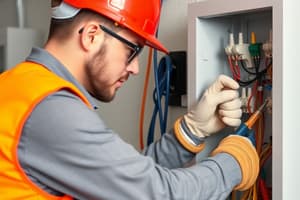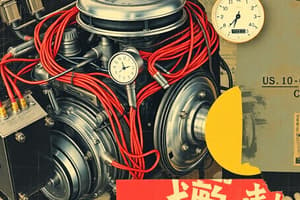Podcast
Questions and Answers
What is essential for minimizing the risk of injury when working with high-voltage electrical equipment?
What is essential for minimizing the risk of injury when working with high-voltage electrical equipment?
- Frequent safety meetings
- Protective personal equipment (PPE) (correct)
- Proper training sessions
- Manual inspection of tools
Which of the following is NOT a recommended safety procedure when working on live circuits?
Which of the following is NOT a recommended safety procedure when working on live circuits?
- Using insulated tools
- Ignoring electrical code compliance (correct)
- Following lockout/tagout procedures
- Establishing clear communication
Why are electricians increasingly needed in modern societies?
Why are electricians increasingly needed in modern societies?
- Declining technology adoption
- Decreased industrial equipment use
- Diminishing electrical standards
- Increasing urbanization and technology dependence (correct)
What factor influences the licensing and equipment operation requirements for electricians?
What factor influences the licensing and equipment operation requirements for electricians?
What is a key component to protect electricians from accidents or property damage?
What is a key component to protect electricians from accidents or property damage?
Which responsibility involves ensuring that existing electrical systems are safe and functional?
Which responsibility involves ensuring that existing electrical systems are safe and functional?
What type of electrician primarily works on residential properties?
What type of electrician primarily works on residential properties?
What is a key skill required for identifying and resolving electrical issues?
What is a key skill required for identifying and resolving electrical issues?
Which of the following tools is specifically designed for testing electrical systems?
Which of the following tools is specifically designed for testing electrical systems?
What education route commonly enables an individual to become a licensed electrician?
What education route commonly enables an individual to become a licensed electrician?
Which of the following is NOT typically associated with the responsibilities of electricians?
Which of the following is NOT typically associated with the responsibilities of electricians?
What aspect ensures that electricians adhere to safety standards?
What aspect ensures that electricians adhere to safety standards?
Which type of electrician is responsible for the upkeep and repair of electrical systems across various settings?
Which type of electrician is responsible for the upkeep and repair of electrical systems across various settings?
Flashcards
Proper PPE
Proper PPE
Protective gear like gloves, safety glasses, and insulated tools used by electricians to prevent injury.
Lockout/Tagout Procedures
Lockout/Tagout Procedures
A set of procedures electricians follow when working on live circuits to prevent accidental energization, such as locking and tagging equipment.
Electrical Code Compliance
Electrical Code Compliance
Rules and regulations governing the design, installation, and maintenance of electrical systems to ensure safety and prevent hazards.
State and Local Requirements
State and Local Requirements
Signup and view all the flashcards
Continuing Education
Continuing Education
Signup and view all the flashcards
What is an electrician?
What is an electrician?
Signup and view all the flashcards
What are the main responsibilities of an electrician?
What are the main responsibilities of an electrician?
Signup and view all the flashcards
What is troubleshooting in the context of an electrician's work?
What is troubleshooting in the context of an electrician's work?
Signup and view all the flashcards
What is maintenance in the context of an electrician's work?
What is maintenance in the context of an electrician's work?
Signup and view all the flashcards
What does a residential electrician do?
What does a residential electrician do?
Signup and view all the flashcards
What does a commercial electrician do?
What does a commercial electrician do?
Signup and view all the flashcards
What does an industrial electrician do?
What does an industrial electrician do?
Signup and view all the flashcards
What does a maintenance electrician do?
What does a maintenance electrician do?
Signup and view all the flashcards
Study Notes
Introduction to Electricians
- Electricians are skilled tradespeople who install, maintain, and repair electrical systems in buildings, homes, and other structures.
- Their work is crucial to ensure safe, reliable, and efficient use of electricity.
- This involves a range of tasks, from wiring houses to troubleshooting complex industrial systems.
Key Skills and Responsibilities
- Installation: Wiring, installing electrical devices, and setting up electrical panels.
- Troubleshooting: Identifying and fixing electrical problems, including short circuits, faulty wiring, and malfunctioning appliances.
- Maintenance: Inspecting and maintaining existing electrical systems to prevent breakdowns and ensure safety.
- Safety: Adhering to strict safety regulations and procedures to prevent incidents, such as electrical shocks or fires.
- Code Compliance: Working in accordance with local electrical codes and regulations.
- Customer Service (often): Communicating with clients to understand their needs and providing solutions.
Types of Electricians
- Residential Electricians: Focus on homes and residential properties.
- Commercial Electricians: Work on buildings like offices, stores, and restaurants.
- Industrial Electricians: Install and maintain electrical systems in factories and industrial settings.
- Maintenance Electricians: Responsible for the upkeep and repair of electrical systems in various settings.
- Licensed Electricians: Hold necessary certifications and licenses to legally practice their trade.
Education and Training
- Apprenticeships: A common route to becoming a licensed electrician, involving on-the-job training and classroom instruction.
- Formal Education: Some electricians pursue vocational training or technical schools initially before apprenticeships or licensure.
- Certifications: Necessary for obtaining licensing and demonstrating competency in different areas.
Tools and Equipment
- Various hand tools: Screwdrivers, pliers, wire strippers, and more.
- Power tools: Often used for cutting, drilling, and fastening.
- Test equipment: Important for troubleshooting and fault detection, such as multimeters and voltmeters.
- Protective gear: Safety glasses, gloves, and other essential personal protective equipment (PPE)
- Electrical conduit and wiring materials
Areas of Specialization
- Low-Voltage Systems: Installing and maintaining low-voltage systems for lighting, security, and other purposes.
- High-Voltage Systems: Working in industrial settings and managing high-voltage electrical equipment.
Industry Trends and Future Outlook
- Automation and technology adoption: Electricians may increasingly use automated systems and software.
- Growing demand: Electricians are needed in increasingly urbanized and technologically advanced societies.
Safety Protocols
- Proper PPE: Essential for minimizing the risk of injury, including protective gloves, safety glasses, and insulated tools.
- Safety Procedures: Following established protocols and following lockout/tagout procedures when working on live circuits.
- Electrical Code Compliance: Adhering to all local and national electrical codes to prevent hazards and ensure safety.
Licensing and Regulations
- State and Local Requirements: Licenses and permits required vary based on location. Specific regulations govern the installation and operation of electrical equipment, and the safety of electrical professionals.
- Continuing Education: Consistent education requirements are common for electricians to retain their certifications.
- Insurance: Professional liability insurance protects electricians from potential accidents or property damage.
Studying That Suits You
Use AI to generate personalized quizzes and flashcards to suit your learning preferences.




